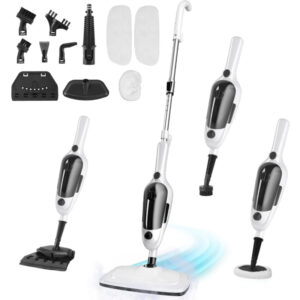Both Target and Walmart took the owned-and-operated private brand strategy and advanced it beyond generic house brands.
Target, you can argue, has made creating brands a huge part of its business model. Much of every Target store is filled with the company’s own clothing brands, but it has taken it well beyond that to cleaning products, multiple food brands, and really, its own take on pretty much every product line the company sells.
Walmart has played follow the leader in that space and has launched multiple clothing brands that it owns.
Under this strategy, the two retail giants have given up the familiarity of selling some name brands. They also cut out a partner and have been able to make higher margins selling at lower prices.
You may not know All In Motion, Target’s athletic clothing brand, but the chain has bet big that if you see it, you will see the quality and like the price.
That strategy has worked well for Target and Walmart and both companies have built brands that now have their own equity.
Image source: Walmart
Kohl’s moves into owned-and-operated brands
Kohl’s (KSS) has been struggling, but interim CEO Michael Bender said that trends have been improving and gave some of the credit to brands the chain owns during Kohl’s second-quarter earnings call.
“We saw our sales progressively improve throughout the quarter, with May having the softest performance due in part to colder, wetter weather over the last couple of weeks of the month, including the Memorial Day holiday, which negatively affected our spring seasonal businesses. We saw improvement in June and ended the quarter strong with July comp sales flat to last year. The improved performance was driven by our digital business and our proprietary brand sales, both of which performed positively in July.”
The chain has been selectively increasing its investment in proprietary brands.
“During the second quarter, we started seeing progress in our Women’s business as we invested back into proprietary brands, streamlined the choices in intimates and reintroduced the petites category. Our Women’s business overpenetrates in our proprietary brands. And as we’ve reinvested in these brands, the Women’s business has benefited,” Bender said.
More Retail Stocks:
- Kohl’s takes drastic action to fix concerning customer behavior
- Costco Drops Long-Term Policy On Offering Only 1 Credit Option
- New Target CEO Making 3 Major Changes to Win Back Shoppers
These efforts have paid off, he added.
“As we reestablished the petites category in all stores, this business accelerated, up almost 40% in the second quarter. This strong performance was led by the introduction of our proprietary brands, Lauren Conrad and Simply Vera Vera Wang,” the CEO shared.
Bender noted that Kohl’s Men’s business was weak during the quarter.
“However, this softness was partially offset by stronger performance in opening price point proprietary brands such as Tek Gear and Jumping Beans,” he added.
Will proprietary brands save Kohl’s?
Bender made it very clear that Kohl’s was all in on owned-and-operated brands.
“We know that we have a powerful set of proprietary brands that build customer trust and loyalty. In addition, customers who buy our proprietary brands spend more of their wallet with Kohl’s. These proprietary brands play an instrumental role in our value proposition. They allow us to offer quality products at a lower opening price point, which highly resonates with our core loyal customers.”
GlobalData Managing Director Neil Saunders believes that strategy is smart.
“And on private label, generally speaking, the strategy is sensible: It helps differentiate, it boosts margins, and it proves a strong value position. However, the development of more own brands needs to be part of a holistic strategy,” he shared on RetailWire.
Author and retail analyst Georganne Bender had a less kind take.
“And really, how much does private label mean to the consumer when the sales floor is a mess?” she posted.
Mark Ryski, the author of multiple books on retail, thinks that Kohl’s need to work on multiple areas.
“Private labels are certainly part of the recovery strategy, but focusing on private brands alone won’t be enough. National brands are still an important part of Kohl’s mix, notwithstanding the fact that the national brands are being outperformed by their private labels,” he shared.
Related: American-made athletic clothing brand liquidating, no bankruptcy
Ryski believes that Kohl’s has a lot of work to do.
“Kohl’s needs to give shoppers a reason to visit their stores — price points and brands can help, but once lost, shoppers are hard to re-engage if there’s no compelling reason to do so. Refocusing on the basics of the store experience in order to maximize in-store conversion rates to make the most of every shopper that visits would be a good step forward,” he added.
Kohl’s owned-and-operated brands
These are brands that Kohl’s owns or retails exclusively, not general national brands:
Apparel & Activewear (partial list)
- SONOMA Goods for Life: Apparel and home goods exclusive to Kohl’s
- FLX: Specialty athleisure brand (both men’s and women’s), launched in 2021
- Tek Gear: Activewear and workout gear
- LC Lauren Conrad: Fashion and lifestyle brand by Lauren Conrad
- Simply Vera Vera Wang: Exclusive fashion brand
- Jumping Beans: Children’s apparel
- Apt. 9: Stylish modern apparel line
- Croft & Barrow: Classic casual apparel basics
- EVRI: Plus-size women’s private-label brand, launched spring 2019
- The Big One: Home goods brand
- Miryana: Private-label linen & home brand, debuted 2025
- Mingle & Co.: Private-label kitchen & dining goods, debuted 2025
- Hotelier: Home brand introduced as part of new private-label home offerings
Source: Kohl’s
Related: Macy’s stock soars 20% as 125 stores drive surprising growth




